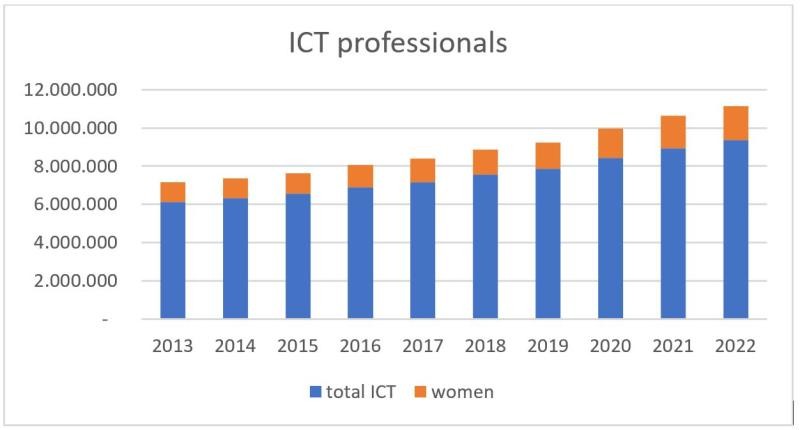Target Group- Women of the “Z Generation”
Key target group of 4equality solution are young women interested in jobs in male dominated industries, specifically in business and STEM occupations. Project focuses on young women age 16-26 that are building qualifications for business and STEM and are preparing for entering the job market . In terms of women generations young girls born between 1998 and 2008 years belong to „Z Generation”
Accessibility to technology and the internet has provided Generation Z with an abundance of information, allowing them to broaden their knowledge and be proactive in learning, making them the most technologically prepared and socially responsive generation to date. The key attributes of Generation Z are: technologically prepared, progressive, curious. (Oana Stoica-Guide for each generation and the traits that differentiate them)
Women Entrepreneurs
In the entrepreneurship domain the Eurochambres Women Network Survey 2023: A Picture of Female Entrepreneurship takes a look on how women entrepreneurs in particular are reacting to the current challenges, while also considering the issues that are more specifically pertaining to female-led businesses.
The survey touches upon different subjects, from skills to work-life balance, from financing to digitalisation and it aims at giving a glance into business environment for a woman. The main objective is provide a help to decision makers to develop more targeted initiatives to support women entrepreneurs across Europe.
The large majority of entrepreneurs are between 40 and 60 years old, even older age. Only a few companies are led by young women. It could be assumed that in the current difficult economic environment the job of entrepreneurs may not be perceived as attractive to young generations as it was in the previous ones.
The size of women enterprise is in line with the general trend of enterprises in Europe, composed mainly by small and medium-sized enterprises, the large majority have a micro enterprise.
The domain of activity is represented mainly by providing services including consultancy, education, financial/professional services, health services, public services and other services). As it is to be expected, more technical jobs are less common among women entrepreneurs
The main obstacles women are currently facing in the running of their business
are the following:
- Bureaucracy and liquidity/access to finance, the main obstacles encountered by women entrepreneurs. It is still necessary to ensure that women have facilitate access, without being discriminated because of their sex or because of their fields of activity.
- Same chances and equal pay: many women entrepreneurs complained about the lack of time for training and professional qualification. Remuneration must become uniform and women need real chance in accessing managerial positions.
- Women entrepreneurs are at the forefront of digital and sustainable transformation.Decision-makers must guarantee access to information on measures and funding initiatives to support these transformations.
Women designers
The European Union Intellectual Property Office (EUIPO) has analysed the gender gap (1) in design from different perspectives, in the Report on_Women_in_Design/2023.
The starting point was the analysis of the participation in the labor market of women designers, measuring the gender gap in terms of employment. In 2021, 24% of designers were women and a similar gender gap in design registration (26% of designs registered with the EUIPO by EU-based owners had at least one female designer in the same year). Although gender gaps have narrowed over the past decade, progress towards gender parity is slow. The average annual growth rate of the number of female designers in the period 2011-2021 was 5%, at this rate it would take 51 years to achieve gender parity.
The gender gap in the employment of designers is explained by the very low proportion of women working as electrical engineers and software developers and analysts and submitting design registration files. The share of women among earth and physical science professionals, architects and urban planners, inspectors and planners is even higher, reaching more than 50% in seven EU Member States.
Women in the digital sector
The EU Report „„DigitalCompass & Digital Decade Policy Programme 2030 (DDPP)” din 2022” is mentioned the following statistics data about women participation in digital sector:
- Only 17% – 1 in 6 ICT specialists in the EU is a woman;
- Only 1 in 3 Science Technology Engineering and Maths (STEM) graduates is a woman;
- Only 19% of European ICT entrepreneurs are women;
- Women working in ICT earn almost 20% less than men do.
- 93% of capital invested in European companies in 2022 went to all-male founding teams
The graph below shows the number of ICT specialists in 2013, indicating that the percentage of women in ICT has not changed much over time.

Adopted on 23 November 2023, the Council Recommendation on improving digital skills in education aims to improve digital skills in education and training, to pursue a fair and inclusive digital transformation that leaves no one behind, underlying the following priciples:
- Technology should be used to unite people, not divide them. The digital transformation should contribute to a fair and inclusive society and economy in the EU.
- Everyone has the right to education, training and lifelong learning and should be able to acquire all basic and advanced digital skills.
Europe is committed to achieving the objectives of the Digital Decade policy programme of employing at least 20 million information and communication technology (ICT) specialists in the EU by 2030, while promoting women’s access to this field.
Bibliography
Eurochambres Women Network Survey 2023: A Picture of Female Entrepreneurship – Eurochambres
DigitalCompass & Digital Decade Policy Programme 2030 (DDPP)” – Search (bing.com)
Council Recommendation on improving digital skills – Search (bing.com)

 Български
Български Ελληνικά
Ελληνικά Polski
Polski Português
Português Română
Română